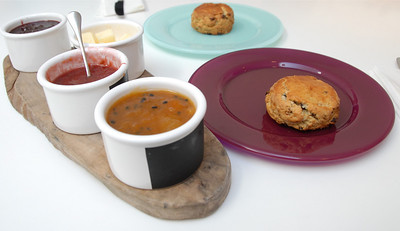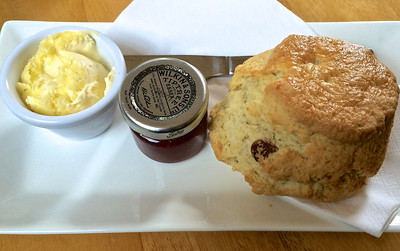
SCONES AT OTTOLENGHI IN LONDON, ENGLAND
I love my morning ritual of coffee and whole grain toast with peanut butter and preserves. Yet, as soon as I step onto British soil, I ditch this duo for a pot of hot, black tea and a rich, slightly sweet fruit scone. Loosely defined as a small, soft, plain cake, the scone is a staple of afternoon tea. If you can track down one that’s warm and fresh from the oven, it’s also a heavenly, albeit filling, breakfast treat.
Although I think of scones as quintessentially English, they’re actually a Scottish specialty. Depending on whom you talk to, their name comes from the ceremonial Stone of Destiny at Scone Abbey in Scotland or from the Scots term “sconbrot,” meaning fine white bread. Originally made from oats and triangular in shape, they were fried on a griddle. Today flour-based scones come in a variety of shapes and are baked. While I prefer plump, dark raisins in mine, they can be either sweet or savory.

RAISIN SCONES IN YORK, ENGLAND
Among the lovely things about scones is how fast and easy they are to make. Give me ten minutes and I can mix and bake a batch for you. They are a quick bread.
If your first attempts at homemade scones resemble hockey pucks, you’ve probably baked them for too long. After five minutes peek inside the oven to ensure that they aren’t becoming overly brown or are cooking unevenly. Rotate the baking sheet and allow them to bake for another two to four minutes before removing and serving.
When stored in an airtight container, homemade scones last three days. In truth, they’re at their best when eaten hot from the oven with a smear of butter or clotted cream.
SCRUMPTIOUS FRUIT SCONES
Consider this your template for making an assortment of dried fruit scones. Currants, dried cranberries, dried cherries, diced dried apricots or diced fresh pears would be good replacements for raisins in the following recipe.
Makes 6 scones
1 2/3 cup all-purpose flour
2 teaspoons baking powder
1/2 teaspoon salt
1/4 cup cold, unsalted butter, diced
1/3 cup plus 1 tablespoon raisins
1/3 cup granulated sugar
1/2 teaspoon vanilla extract
1/2 cup buttermilk
1 egg, beaten, for brushing over the tops
Preheat the oven to 450 degrees Fahrenheit. Line a baking sheet with parchment paper and set aside.
Sift the flour, baking powder and salt into a large bowl and whisk together. Using your fingers, rub the butter into the flour until it resembles coarse breadcrumbs. Add the raisins and sugar and stir to combine.
Make a well in the center of the mixture. Whisk together the vanilla and buttermilk. Pour in the buttermilk into the well and stir the ingredients together until a soft dough forms.
Lightly flour a clean work surface. Place the dough here and gently knead it for 10 to 20 seconds. Over-kneading will make the scones more like bread, less like scones. Using a lightly floured rolling pin, roll out the dough to about 1-inch thick. Cut the dough into rounds using a flour-dusted, 2 1/2-inch biscuit cutter.
Place the scones on the parchment-lined baking sheet. Brush the tops with the beaten egg and then bake for 7 to 10 minutes, checking after 5 or 6 minutes to ensure that they’re baking evenly. When finished, they will be plump and golden on top. Remove and serve warm.